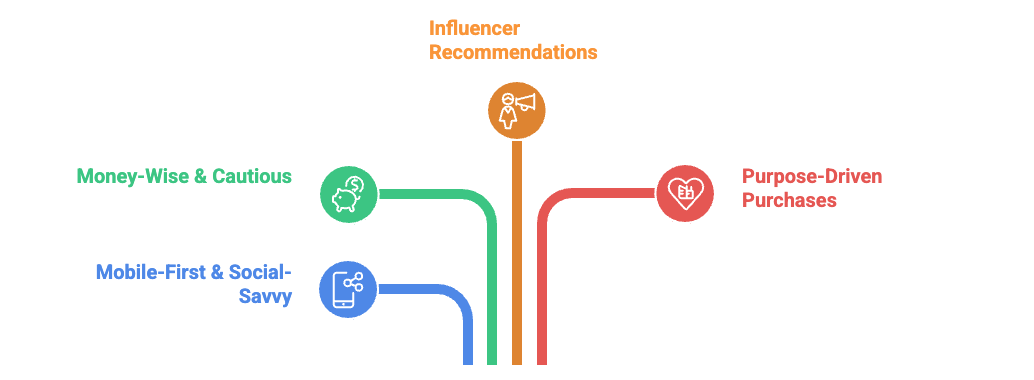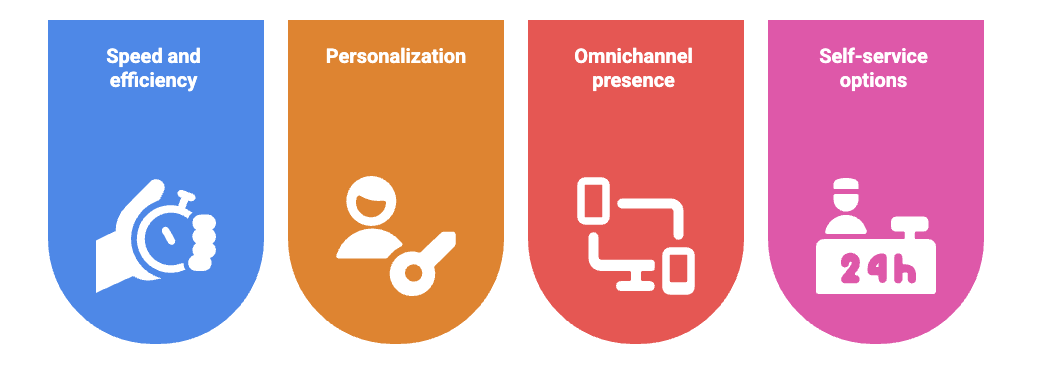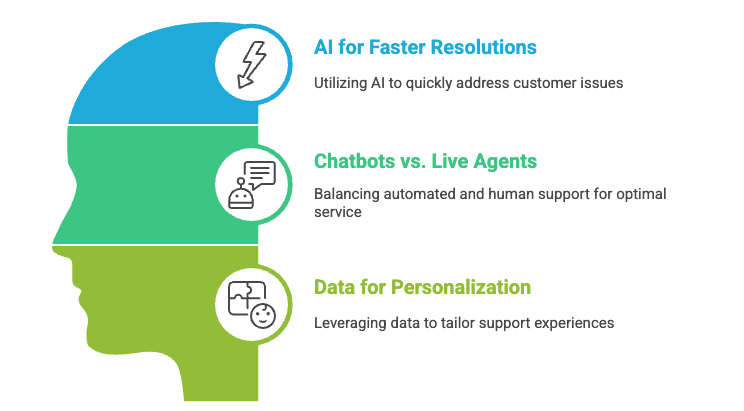Set up AI agents for customer support in less than 10 minutes
Set up AI agents in minutes
Gen Z customer service: Expectations, technology & trust in 2026
Sneha Arunachalam .
Jul 2025 .

If your customer service isn’t fast, real, and values-first—Gen Z has already moved on.
Meet Gen Z: the first truly digital-native generation with zero patience for outdated customer service. They won’t wait on hold, tolerate robotic responses, or support brands that feel inauthentic. For them, customer service isn’t just about solving problems—it’s about how your brand shows up in moments that matter.
In this blog, we’ll dive deep into who Gen Z really is, what they expect from support teams, and how your business can adapt using smart technology, real conversations, and value-driven strategies to earn their trust—and keep it.
Who are Gen Z customers and why they matter
Born between 1997 and 2012, Generation Z is the first group that never knew life without smartphones and social media. They're making up 25% of the global population right now, and ignoring them isn't an option if you want to stay in business.
Digital natives with high expectations
Think of it like this: while millennials adapted to technology, Gen Z was molded by it. They got their first smartphones at 12 — five years earlier than millennials — and they're online for 10.6 hours daily compared to millennials' 6.8 hours.
This constant connection turned them into information-gathering machines who jump between online and offline experiences without missing a beat. They expect brands to be everywhere they are — apps, websites, physical stores — and it all better work seamlessly.
Here's what's wild: 98% use social media, and they're researching products on TikTok before buying. They want digital experiences that actually solve problems instead of creating new ones. No patience for clunky interfaces or dead-end help pages.
How Gen Z Is not just a younger millennial
Think Gen Z is just a younger version of millennials? Think again. These two generations are wired very differently — especially when it comes to shopping, spending, and social media.

Mobile-first and social-savvy:
Gen Z makes mobile purchases twice as often as millennials. They also spend nearly 4 hours a day on social media, compared to millennials’ 2.6 hours. That’s a big gap — and a big opportunity for brands to meet them where they are.
Money-wise and cautious:
Gen Z grew up watching economic uncertainty unfold — and it shows. 41% identify as careful spenders, versus 37% of millennials. They're more value-conscious, looking for smart buys rather than flashy ones.
Influencers > Reviews:
While 80% of millennials check online reviews before buying, Gen Z is more likely to trust influencers. In fact, 44% of Gen Z will buy based on an influencer's recommendation, compared to just 26% of everyone else.
Purpose-driven purchases:
For Gen Z, it's not just about the product — it’s about the brand’s purpose. They care deeply about authenticity, sustainability, and shared values. If your brand doesn’t stand for something, they’re quick to look elsewhere.
The rise of Gen Z purchasing power
Here's where it gets interesting for your bottom line. Gen Z currently controls 17.1% of global spending, but they're projected to hit $12 trillion in purchasing power by 2030. They'll overtake Baby Boomer spending by 2029.
The growth rate tells the real story — Gen Z spending is expanding at 4.02% annually, exactly double the pace of previous generations. They're already spending $360 billion and expected to add nearly $9 trillion in global spending by 2034.
Even more impressive? The average 25-year-old Gen Z earns $40,000 annually — more than any other generation at the same age. This early financial advantage positions them to become the wealthiest generation in history. You're not just serving today's customers — you're building relationships with tomorrow's biggest spenders.
What Gen Z expects from customer service
Here’s the deal — Gen Z brings four non-negotiable expectations to every customer service interaction. And if you don't get these right, you're basically starting every conversation at a disadvantage.
And honestly, that’s exactly why platforms like SparrowDesk are starting to gain traction.
We’ve been testing it internally, and the difference shows - faster replies, smarter AI suggestions, and way cleaner workflows that actually match how Gen Z wants to interact.
If you're building a support setup that feels modern (and not stuck in 2016), it’s definitely worth trying.
Sign up for a 14-day free trial and see how much smoother your support gets.
See what Gen Z–ready support looks like.

Gen Z wants answers. Now. The need for speed in customer support
Think of it like this: Gen Z grew up with Google giving them answers in 0.3 seconds, TikTok videos that hook them instantly, and same-day delivery as the standard. When they reach out for help, over 57% expect responses within 24 hours, with 27% wanting answers within just a few hours.
We're talking about a generation where 55% use their phones five or more hours daily and have attention spans of roughly eight seconds for ads. Waiting just isn't in their vocabulary — they expect information to be there when they need it, not when it's convenient for you.
What Happens When You're Too Slow
Speed isn't just a nice-to-have anymore—it's a dealbreaker. When Gen Z reaches out and hits a wall of silence, they're not sitting around waiting. They're opening new tabs, checking out your competitors, and mentally writing you off.
The modern customer journey doesn't pause for slow response times. While waiting for your email reply, they've already:
- Searched for alternative brands on their phone
- Read reviews comparing you to competitors
- Asked their group chat for recommendations
- Maybe even placed an order elsewhere
And here's the kicker: they'll remember that wait time. Not just for this purchase, but for every future interaction they might have considered with your brand.
Speak to Gen Z — Personally
Generic responses feel like spam to Gen Z. A solid 77% believe brands should customize experiences to their interests and needs, and 72% will actually stick around longer when you personalize their service.
What's interesting is how willing they are to make this work:
- 44% will trade personal data for more tailored experiences
- 74% would spend more with companies providing good personalized experiences
- 65% would abandon retailers that don't personalize interactions
They've grown up with curated content streams, so one-size-fits-all approaches feel outdated to them.
What Gen Z Considers Personal
Personalization to Gen Z goes way beyond "Hi [First Name]." They notice when brands remember their preferences, anticipate their needs, and speak to them like humans rather than ticket numbers.
Real personalization looks like:
- Remembering their previous purchases without making them explain their history
- Recognizing which channel they prefer and meeting them there
- Understanding context from their last interaction, even if it was on a different platform
- Adjusting tone and style to match how they communicate
- Offering solutions relevant to their actual behavior, not demographic assumptions
Omnichannel isn’t the future — It’s Gen Z’s present
For Gen Z, jumping between channels should feel effortless. They might shoot you an email today, drop a DM on Instagram tomorrow, and follow up on WhatsApp — and they expect the experience to stay consistent throughout.
Social media isn’t just for scrolling anymore — it’s a go-to for support. If your brand’s not showing up where they already are, you’re probably getting left on “seen.”
It’s not about being everywhere — it’s about making every touchpoint feel like the same helpful, human brand.
Popular Channels Gen Z Actually Uses for Support
Instagram and TikTok DMs: Not just for influencer collaborations anymore. Gen Z expects brands to be responsive here because they're already spending hours on these platforms daily.
WhatsApp and SMS: Perfect for transactional updates and quick questions. The intimacy of text messaging feels personal and convenient for Gen Z.
Live Chat: Still relevant when embedded smartly on websites and apps. Gen Z appreciates the immediacy without needing to leave what they're doing.
Email: Not dead, just evolved. Gen Z uses email for complex issues that need detailed explanations or when they want a paper trail.
Phone Calls: The last resort, not the first option. Gen Z will call when they're truly frustrated or when other channels have failed them.
The key isn't being on every single platform—it's being excellent on the platforms your Gen Z customers actually use, and making sure those platforms work together seamlessly.
Self-service isn’t optional for Gen Z — It’s the first step
When something goes wrong, Gen Z doesn't want to call, email, or wait. They want to fix it themselves — fast. And if your self-service options aren’t up to the mark? Many won’t even bother trying again.
What’s at stake? Trust. Loyalty. And yes, even your reputation.
The good news? Gen Z is more patient than you’d expect — they’ll give you a couple of chances to get it right. But that grace period vanishes quickly if they keep hitting dead ends.
If your help center, FAQs, or chatbots aren’t delivering real answers, you’re not just losing users — you’re losing future customers.
That’s exactly where modern support platforms start to make a real difference.
Instead of forcing customers through rigid flows, platforms like SparrowDesk are built to support self-service first — without trapping users in it.

Search understands natural questions, help articles surface based on intent, and AI agents step in only when they can genuinely help. When they can’t, handoff to a human is instant and context-aware.
See how Gen Z-ready self-service actually works
The result is simple: Gen Z gets answers fast, agents don’t repeat work, and support feels like it’s actually working with the customer — not against them.
If your current setup still treats self-service as a checkbox instead of a real experience, that gap is exactly where Gen Z trust starts to break.
What Good Self-Service Actually Looks Like
Search That Actually Works
Gen Z types questions naturally, not in keyword robot-speak. Your search function needs to understand phrases like "why is my order taking so long" not just exact matches for "order status." Implement natural language processing that interprets intent, not just words.
Predictive search is crucial too. As they type "how do I return," your search should already be suggesting "how do I return a product" and "return policy" and "return shipping cost." Every character they type should make finding answers easier.
Video Tutorials That Respect Their Time
Gen Z learns visually, but they're not watching 15-minute tutorials. Create focused, bite-sized videos that solve one specific problem in under two minutes. Think TikTok-style quick tips, not lecture-length explanations.
Show, don't just tell. Screen recordings with voiceovers work better than someone talking to a camera. And make these videos easy to find—embed them directly in relevant help articles, not hidden in a separate video library.
FAQs That Anticipate Real Questions
Your FAQ section shouldn't be what you want customers to know—it should answer what they actually ask. Mine your customer service tickets, social media comments, and chat logs to find the real questions people have.
Organize FAQs by situation, not by your internal department structure. Gen Z doesn't care which team handles refunds versus exchanges—they just want to find "What if my product arrived damaged?"
Chatbots That Know Their Limits
Gen Z doesn't hate chatbots—they hate bad chatbots. The ones that pretend to understand but can't actually help. The ones that loop them through irrelevant options. The ones that make reaching a human unnecessarily difficult.
Good chatbots are upfront about what they can and can't do. They handle simple stuff confidently and escalate to humans gracefully. They never trap customers in automated loops when it's clear they need human help.
How technology can meet Gen Z expectations

Think of it like this: If Gen Z customers are speed demons on the digital highway, your technology needs to be the high-performance engine that keeps up. These digital natives don't just tolerate tech solutions — they expect them to work flawlessly.
Using AI for faster resolutions
Here's something interesting — Gen Z customers now see AI as a normal part of customer service. They're not scared of chatbots; they're actually pretty good at getting what they need from them.
Gen Z appreciates AI for three main reasons:
- Perfect for simple fixes
- Prefer it for basic questions
- Love how fast it is
What makes this work? Gen Z grew up as natural "prompt engineers" — they instinctively know how to talk to AI to get the right answers. For your business, that means AI can handle the flood of routine questions, especially when you're launching something new or running a promotion.
And that’s exactly where SparrowDesk shines. Its AI isn’t an afterthought. It’s built from the ground up to handle customer queries instantly.
Routine questions get resolved fast, while agents get smart support: they can generate instant summaries, draft replies in seconds, and access the right information immediately. The result? Every customer gets quick, accurate answers, and your team stays efficient, focused, and stress-free.
Start resolving customer queries instantly — try SparrowDesk free today!
Build Gen Z-ready customer support.
Where AI Works Best
Immediate Acknowledgment
Nobody likes being ignored. AI ensures every customer gets an instant response, even if it's just confirming their message was received and help is coming. This simple acknowledgment dramatically reduces anxiety and frustration.
24/7 Availability
Gen Z doesn't keep business hours—they shop, browse, and need help at 2 AM just as much as 2 PM. AI-powered support means being there whenever they need you, without requiring your team to work night shifts.
Handling Volume Spikes
Product launches, viral moments, and seasonal rushes create support tsunamis. AI scales instantly to handle thousands of simultaneous conversations without wait times ballooning.
Collecting Context Before Handoff
Smart AI chatbots gather relevant information—order numbers, issue descriptions, customer preferences—before passing to a human agent. This means no repeating information and faster resolution times.
Chatbots vs. live agents: finding the balance
But here's where it gets tricky — Gen Z still want humans for complex stuff. They're not trying to replace people entirely. When things get complicated, they want to talk to someone who actually gets it.
The numbers tell the story:
- 86% prefer humans for billing issues
- 88% want humans for big purchases
- 77% choose humans for returns
The Sweet Spot: AI-Human Hybrid Support
Use AI as your first line of defense, then make it super easy to reach a real person when needed.
Almost all Gen Z respondents would use AI agents — as long as they can get to a human when things go sideways.
Tiered Support System
Create a support structure where:
- Tier 1: AI handles common questions with instant responses
- Tier 2: Human agents address complex issues escalated from AI
- Tier 3: Specialized team members handle technical, billing, or VIP concerns
Intelligent Routing
Use AI to determine which issues need human attention immediately. Train your system to recognize frustration signals, complexity indicators, and high-priority situations that skip the bot entirely.
Seamless Handoffs
When transitioning from AI to human, carry over all context. The human agent should see the entire bot conversation and any data collected. Starting over is the cardinal sin of hybrid support.
Augmented Human Agents
Give your human agents AI-powered tools that suggest responses, pull relevant information, and handle routine tasks in the background. This makes humans more efficient without making them feel replaced.
Using data for personalization
We totally get why personalization matters so much to Gen Z. They've grown up with algorithms that just know what they want to see next. When your brand doesn't remember their last interaction, it feels broken.
Gen Z expects you to remember them. They're used to Netflix knowing their taste in shows and Spotify creating perfect playlists without being asked. Your customer service should feel just as intuitive. The good news? You can use their data to create those personalized experiences that build real loyalty.
With SparrowDesk, personalization isn’t layered on as a feature, it’s built into how conversations work.
Every interaction carries context forward, so agents (and AI) can see past conversations, preferences, and history without customers having to repeat themselves.
Whether someone reaches out via chat today or email next week, the experience feels continuous and familiar.
Deliver support Gen Z recognizes instantly
Instead of relying on generic scripts, SparrowDesk helps teams respond with relevance, surfacing the right information, suggesting smarter replies, and keeping the focus on what the customer actually needs in that moment.
The result is support that feels intuitive, personal, and consistent, exactly what Gen Z expects.
What Data Actually Matters
Not all data creates better experiences. Gen Z cares about personalization that's useful, not intrusive. Focus on:
Behavioral Data
What they browse, what they buy, what they abandon in carts, which emails they open, which features they use most. This shows actual interests rather than assumed preferences.
Interaction History
Previous support tickets, communication channel preferences, common questions they ask. This prevents repetition and shows you value their time.
Preference Settings
What they explicitly tell you: notification preferences, communication frequency, favorite product categories. Respect these choices religiously.
Contextual Information
Device they're using, time of day they typically engage, current journey stage. This helps you meet them with relevant information at the right moment.
Turning Data into Better Experiences
Proactive Support
Use customer purchase data to anticipate needs. Someone buys a printer? Send setup tips before they ask. Someone's subscription renewal is coming? Remind them with renewal options before they forget and get frustrated.
Personalized Recommendations
In support contexts, suggest help articles based on what they're trying to do. If they're viewing return policy, also show exchange options and refund timelines—anticipate the full question, not just the first part.
Dynamic Content
Show different homepage content to first-time visitors versus loyal customers. Adjust email content based on purchase history. Customize chat greetings based on where they are in their journey.
Learning Systems
Build feedback loops where every interaction teaches your system more about each customer. When they rate an article as helpful, show similar content next time. When they prefer chat over email, remember that.
Support that gets the vibe
Reading Between the Lines
Connecting with Gen Z takes more than just listening — you have to get what they're really saying. Their communication isn't always straightforward; it's layered with emotion, tone, and even punctuation.
That's where a modern support platform with sentiment analysis comes in. It helps your team catch those subtle signals — like the tiny shift between "ok" and "ok!", or when a friendly emoji might actually mean "I'm not fine."
Gen Z has their own language, and it's not one you'll find in a textbook:
- Emojis and GIFs speak louder than paragraphs
- Slang changes by the week (sometimes the day)
- A quick change in tone can tell you more than a long message
- Message bursts and punctuation often hint at urgency or mood
Your support team needs tools that can keep up. Sentiment analysis helps agents see beyond words — spotting frustration before it turns into a bad experience, or excitement before it fades away. It's like emotional radar for every conversation.
The Result: Real Connection
When agents can sense how someone feels, they respond differently. They sound human. They show empathy. They match the customer's tone instead of replying with canned lines.
That's where the real magic happens — when support stops sounding like "support" and starts feeling like a genuine conversation.
Because at the end of the day, great service isn't just about fast replies — it's about making people feel heard.
Training teams to connect with Gen Z
Think of it like this: your customer service team is like a bridge between your brand and Gen Z. Without proper training, that bridge might as well be made of paper.
Empathy and emotional intelligence
Gen Z can smell insincerity from a mile away. They want brands that actually get them, especially when they're dealing with stressful stuff like insurance claims or health issues. Your agents need to meet them where they are emotionally — not where you think they should be.
Role-playing exercises work wonders here. Put your agents through high-stress scenarios so they can practice connecting with customers on their worst days. The goal isn't just solving problems — it's making people feel heard.
Understanding how Gen Z communicates
Here’s the thing about Gen Z: they crave communication that’s fast, visual, and real. Yes, a solid 75% prefer texting over phone calls — but that doesn’t mean they’re avoiding human connection. In fact, 39% still believe one-on-one communication is the most effective when it feels genuine.
So what does that mean for your support team?
It’s not just about channel choice — it’s about how they connect. Gen Z expects your team to be clear, casual, and real. Stiff scripts and corporate speak are an instant turn-off. What works instead is a tone that feels friendly, honest, and effortless.
Your team should be trained to:
- Speak like a human, not a bot — skip the jargon, keep it simple
- Use casual, respectful language that mirrors how Gen Z talks
- Incorporate visuals like images, emojis, or GIFs where appropriate
- Give direct feedback and updates regularly — they value clarity
- Stay authentic — no forced slang or “trying too hard to be cool”
Using tools to support agent productivity
Agent burnout is real, employees feel it, and say it hurts their performance. You can't expect great customer service from exhausted people.
Microlearning is your friend here. Break training into bite-sized chunks that agents can access on their phones. They can learn during breaks, between calls, whenever works. Add some gamification with points and badges — it sounds silly, but people love seeing their progress.
Don't forget about knowledge management systems inside your customer service software.Keep them updated based on what agents actually need to know. And remember — Gen Z customers will bail if they can't self-serve. Train your agents to support that journey, not fight it.
Building loyalty through feedback and values
Here's something that might surprise you — 59% of Gen Z consumers will give companies a second chance after a poor service experience. That's actually good news if you're willing to listen and learn from your mistakes.
Creating feedback loops for continuous improvement
Think of feedback like this: if Gen Z customers are willing to give you another shot, you better make it count.
The real magic happens when you collect insights from everywhere they interact with your brand. Social media comments, support tickets, app reviews — it all tells a story about how Gen Z sees your service quality. Companies that pay attention to these signals can adapt quickly while their competitors are still figuring out what went wrong.
Aligning with Gen Z values: ethics, diversity, and sustainability
Gen Z doesn't just buy products — they buy into what you stand for. A solid 70% are more likely to purchase from companies that align with their values. What matters most to them?
- Sustainability: 73-77% will pay more for sustainable products
- Diversity and inclusion: 76% consider these extremely important
- Social responsibility: 68% prefer brands supporting social causes
What sets Gen Z apart from millennials is how deep their commitment runs. We're talking about 91% who want to buy from sustainable companies and 76% who'd pay more for gas if carbon emissions were offset. Plus, 85% say authenticity is critical when choosing brands.
Transparency and authenticity in brand messaging
For Gen Z, trust isn't just important—it's everything. Once they lose faith in your brand, it's nearly impossible to win them back. Forget loyalty perks or clever campaigns—authenticity is the real currency. And that doesn’t mean just saying the right things; it means showing the truth behind the message. They want to see real impact, not vague claims or buzzwords.
Gen Z grew up spotting filters and fakes, so polished marketing fluff won’t work. Be honest. Be transparent. Show your process, your progress, even your imperfections. That’s how you earn their trust—and keep it.
Gen Z vs millennial customer service: The deeper behavioral divide
On paper, Gen Z and millennials may look similar. Both are digital-first. Both value convenience. Both dislike bad service.
But in practice, they respond to customer service in fundamentally different ways.
The difference isn’t just age, it’s the world each generation grew up navigating. Economic instability, algorithm-driven platforms, and always-on communication have shaped Gen Z’s expectations far beyond what millennial-era support systems were built for.
To design effective Gen Z customer service, you need to unlearn some of the assumptions that worked well for millennials.
That’s why modern support can’t just be a slightly improved version of what worked before.
Platforms like SparrowDesk are designed for this shift, where speed, context, and adaptability matter more than rigid workflows and legacy ticketing logic.
Instead of forcing Gen Z into processes built for a different era, SparrowDesk helps teams meet them with faster responses, smarter AI assistance, and conversations that carry context across channels.
Stop using millennial-era support systems
It’s not about adding more tools. It’s about rebuilding customer service for how Gen Z actually interacts today.
1. The psychology of Speed: Instant vs “Reasonable”
Millennials came of age when waiting was normal. Loading screens, delayed emails, and ticket queues were expected parts of digital life.
Gen Z never learned that patience.
They grew up with:
- Real-time search
- Instant streaming
- Push notifications
- On-demand everything
So when Gen Z reaches customer service, speed isn’t just about efficiency — it’s about respect. A delayed response signals disorganization, lack of care, or worse, dishonesty.
In Gen Z customer service, response time is brand trust.
Millennials ask, “When will I hear back?”
Gen Z asks, “Why haven’t you replied yet?”
2. Channel expectations: Destination-based vs embedded support
Millennials are comfortable navigating to support.
- Help centers
- Email forms
- Ticket portals
Gen Z expects support to exist inside whatever they’re already doing.
If they’re on Instagram, support should be there.
If they’re on WhatsApp, support should be there.
If they’re on your app, support should be one tap away.
This is a critical Gen Z vs millennial customer service difference.
For Gen Z:
- Switching apps = friction
- Filling forms = abandonment
- Repeating context = frustration
They don’t think in “channels.” They think in conversations.
3. Self-Service mindset: Optional vs mandatory
Millennials like self-service.
Gen Z expects it.
For millennials, self-service is a convenience.
For Gen Z, it’s the baseline.
If Gen Z can’t find answers instantly through:
- Search
- FAQs
- In-app help
- Chatbots
They don’t escalate — they exit.
This is why broken help centers are especially dangerous for Gen Z customer service. Every failed search erodes confidence that the brand is competent at all.
4. AI perception: Novelty vs infrastructure
Millennials still view AI as a feature.
Gen Z views AI as infrastructure.
They don’t care that AI is being used — they care whether it:
- Responds fast
- Understands intent
- Knows when to escalate
- Doesn’t pretend to be human
In Gen Z vs millennial customer service, this shows up clearly:
- Millennials tolerate clunky bots
- Gen Z immediately disengages from them
Bad AI doesn’t feel like automation to Gen Z — it feels like being ignored.
5. Tone and language: Professional vs human
Millennials grew up with corporate professionalism.
Polite, structured, and formal language felt trustworthy.
Gen Z grew up decoding:
- Influencer captions
- Group chats
- Meme culture
- Short-form video
They read tone instantly — and spot artificial language immediately.
In Gen Z customer service, tone matters as much as resolution.
They want:
- Direct answers
- Clear updates
- Human phrasing
- Emotional awareness
Scripts don’t reassure them. Transparency does.
6. Loyalty triggers: Experience vs values
Millennials build loyalty through repeated positive experiences.
Gen Z builds loyalty through alignment.
Customer service is one of the fastest ways Gen Z evaluates whether a brand:
- Respects them
- Shares their values
- Takes accountability
- Operates ethically
A polite but evasive response damages trust more than a direct admission of a mistake.
This is a defining Gen Z vs millennial customer service shift:
- Millennials reward reliability
- Gen Z rewards honesty
Gen Z vs millennial customer service: Expanded comparison table
Dimension | Gen Z Customer Service | Millennial Customer Service |
|---|---|---|
Response Time Expectation | Immediate or near-instant | Same day is acceptable |
View of Waiting | Interpreted as neglect | Interpreted as process |
Primary Support Entry Point | Social DMs, in-app chat, messaging | Email, chat widgets, portals |
Channel Switching Tolerance | Very low | Moderate |
Self-Service Dependency | Mandatory first step | Helpful option |
AI Acceptance | High — if competent | Mixed — cautious |
Tolerance for Bad Bots | Extremely low | Moderate |
Tone Preference | Casual, honest, human | Professional, structured |
Escalation Behavior | Leaves silently | Complains or follows up |
Loyalty Driver | Values + transparency | Consistency + convenience |
Memory of Poor Service | Long and public | Forgiving if resolved |
Expectation of Brand Stance | Expects clear values | Neutrality acceptable |
What this means for modern support teams
If your customer service was designed for millennials, it may still function, but it won’t win Gen Z.
Winning at Gen Z customer service requires:
- Faster systems
- Fewer steps
- Smarter self-service
- Better AI-human collaboration
- Honest, human communication
The brands that adapt will benefit across generations.
The ones that don’t won’t hear complaints — just silence.
And silence, for Gen Z, means they’re already gone.
Here’s a fully written, copy-paste-ready section you can drop straight into your blog.
It’s detailed enough to increase dwell time, but still scannable and SEO-clean.
I’ve woven Gen Z customer service naturally throughout without keyword stuffing.
How Gen Z interacts with customer service: Real-world scenarios
To truly understand Gen Z customer service, you need to look beyond theory and into real moments where expectations are either met—or completely broken. Gen Z doesn’t experience support as a “process.” They experience it as a conversation happening in real time, on their terms.
Below are three common, high-impact scenarios that show exactly how Gen Z behaves, what they expect, and where most brands lose them.
Scenario 1: Order delay via instagram DM
The situation
A Gen Z customer ordered a product after seeing it on Instagram. The delivery is delayed, and tracking hasn’t updated. Instead of emailing support, they open Instagram and DM the brand directly.
What Gen Z expects
- A fast reply — ideally within minutes, not hours
- Confirmation that a real issue is being looked into
- Clear, honest information (even if the news isn’t great)
- A conversational, human tone that matches the platform
To Gen Z, Instagram isn’t a “marketing channel” — it’s a communication channel. If you’re active there, support should be too.
What breaks the experience
- No reply, or a reply hours later
- Auto-responses saying “Please email support@…”
- Generic apologies without answers
- Being redirected to a form or ticket portal
- Tone that sounds corporate or scripted
At this point, Gen Z doesn’t escalate — they disengage. Silence on social feels like being ignored in public.
What “good” looks like
- Quick acknowledgment in the DM
- A short, clear update on what’s causing the delay
- Ownership of the issue, not deflection
- A follow-up when there’s progress
In strong Gen Z customer service, social DMs feel like a first-class support channel, not an afterthought.
Scenario 2: Subscription cancellation via chat
The situation
A Gen Z customer wants to cancel a subscription they no longer use. They open live chat from your website or app expecting a quick exit.
What Gen Z expects
- Immediate access to chat without friction
- A clear, respectful cancellation process
- No guilt-tripping or aggressive retention tactics
- Transparency around billing, refunds, or reactivation
Gen Z values control. They don’t want to “convince” a brand to let them leave.
What breaks the experience
- Being forced to explain why they’re canceling
- Long scripts trying to “save” the account
- Hidden cancellation steps
- Bots that refuse to escalate to a human
- Language that feels manipulative or passive-aggressive
This is where Gen Z vs millennial customer service really diverges.
Millennials tolerate retention flows. Gen Z sees them as disrespectful.
What “good” looks like
- A fast, no-pressure cancellation option
- Clear confirmation of when billing stops
- Optional feedback — not mandatory
- A calm, respectful tone that keeps the door open
Ironically, Gen Z is more likely to return to brands that let them leave easily.
Scenario 3: Refund follow-up after self-service failure
The situation
A Gen Z customer tried to resolve a refund through FAQs or a chatbot but couldn’t find the answer. They now reach out via chat or email, already slightly annoyed.
What Gen Z expects
- The system to remember what they already tried
- No repetition of details
- A quick handoff to a human if needed
- Acknowledgment of frustration, not defensiveness
Self-service failing once is okay. Failing twice feels like incompetence.
What breaks the experience
- Asking them to restate everything
- Sending links to the same help articles again
- Bots looping endlessly
- “We apologize for the inconvenience” without action
- Long refund timelines with vague updates
This is where many Gen Z customer service experiences fall apart — not because the issue is complex, but because the system doesn’t respect context.
What “good” looks like
- Immediate recognition of prior attempts
- A human agent stepping in at the right moment
- Clear refund status and timelines
- Proactive updates until resolution
When Gen Z sees effort and accountability, frustration drops quickly.
Why these scenarios matter
These interactions highlight a core truth about Gen Z customer service:
Gen Z doesn’t judge support by policies or tools.
They judge it by how smoothly a problem disappears.
Brands that succeed:
- Meet Gen Z where they already are
- Respond fast, without friction
- Respect context and emotional state
- Blend self-service, AI, and humans seamlessly
Brands that fail don’t hear complaints — they see churn.
And that’s the real difference in Gen Z vs millennial customer service:
Millennials complain.
Gen Z moves on.
Conclusion
Here's the thing — getting Gen Z customer service right isn't about picking between technology and human connection. It's about knowing when to use each one. These customers want AI for the quick stuff and real people for the complex problems. Your job is making sure both work seamlessly together.
Think of it like this: if you nail their "self-service or no service" mentality, you're already ahead of most companies. But when they do need help, they want it fast, personalized, and from someone who actually gets their frustration.
The companies that figure this out now will own the next decade. Gen Z's spending power is exploding, and they remember brands that treat them right. More importantly, they'll abandon the ones that don't — and they're not shy about telling everyone why.
Your customer service strategy doesn't need to be perfect tomorrow. But it needs to be evolving today.
Because while other businesses are still debating whether Gen Z matters, the smart ones are already building the relationships that'll pay off for years to come.
The shift toward Gen Z customer service isn’t a trend, it’s a reset. One that rewards brands willing to move faster, listen harder, and design support around real human behavior instead of legacy processes.
If your systems were built for a different generation, now is the moment to rethink them. Not with more scripts or more tools, but with support that’s flexible, context-aware, and genuinely helpful at every step.
That’s exactly what platforms like SparrowDesk are built for bringing AI and human support together in a way that feels seamless, personal, and ready for what comes next.
Build customer service Gen Z will stick with.
Try SparrowDesk free and start evolving your support today.
Quick summary: Gen Z customer service: Essential strategies that actually work
Gen Z customer service isn't just about solving problems—it's about meeting the expectations of digital natives who demand speed, authenticity, and seamless experiences. Born between 1997-2012, this generation controls 17.1% of global spending and expects brands to show up wherever they are, whenever they need help.
- Speed is Non-Negotiable: Digital natives expect instant responses and won't wait on hold for solutions
- Personalization Matters: Generic responses feel like spam—they want customized experiences that reflect their interests
- Omnichannel is Essential: They jump between email, social media, and messaging apps expecting consistent experiences
- Self-Service First: They want to fix problems themselves before reaching out for help
- Values-Driven: They're more likely to purchase from companies that align with their values around sustainability and authenticity
Mastering Gen Z customer service requires balancing AI efficiency with human connection. Companies that adapt now will capture this generation's rapidly growing purchasing power and loyalty. Success means being fast, real, and values-first in every interaction.
Frequently Asked Questions
MORE LIKE THIS
Support made easy. So your team can breathe.





.jpg&w=3840&q=75)
